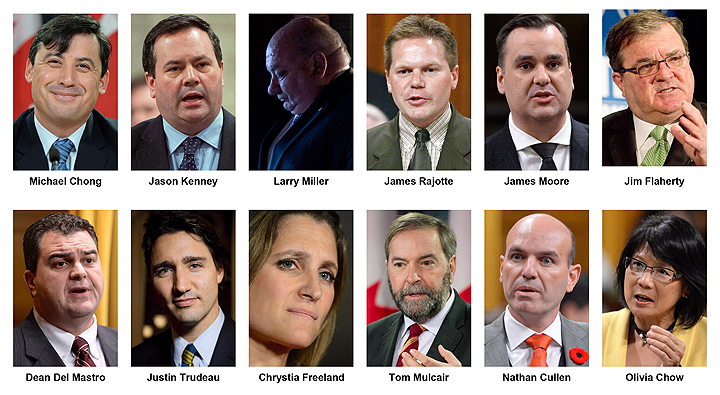OTTAWA – No one can predict the political future but here’s a list of a dozen federal MPs worth watching in 2014. A large number are in their 40s or younger, suggesting a generational change may be afoot in federal politics:

Michael Chong. The former Conservative intergovernmental affairs minister, who quit cabinet in 2007 over Prime Minister Stephen Harper’s move to recognize Quebec as a nation within Canada, is pushing parliamentary reform that would give backbench MPs more independence, and future prime ministers less caucus control. If the bilingual 42-year-old Ontarian isn’t harbouring future leadership ambitions, he should be.
Jason Kenney. The minister of employment and social development has long had a power base within the Conservative movement in his own right. He made some waves late in 2013 when he abandoned the party line by supporting former Harper chief of staff Nigel Wright and by calling for Toronto Mayor Rob Ford’s resignation. Kenney, 44, must find a way to make a key Conservative promise, the already-advertised Canada Job Grant, a reality. He’ll also be under intense scrutiny by Conservatives interested in succession planning.
Larry Miller / James Rajotte. Miller from rural southwestern Ontario and Rajotte from Edmonton are well-respected anchors in the Conservative caucus. They both support Chong’s private member’s reform bill. Neither is a partisan firebrand or caucus trouble-maker. If parliamentary reform is to become reality, it will require the steady resolve of backbenchers such as these.
- Canadian man dies during Texas Ironman event. His widow wants answers as to why
- ‘Sciatica was gone’: hospital performs robot-assisted spinal surgery in Canadian first
- Honda’s $15B Ontario EV plant marks ‘historic day,’ Trudeau says
- Several baby products have been recalled by Health Canada. Here’s the list
James Moore. The bilingual British Columbian makes every short list of potential successors to Stephen Harper. His move to industry minister from heritage last summer appeared designed to give the 37-year-old more economic gravitas. If the Conservatives’ much-hyped consumer-oriented focus on cellphone plans and cable TV is to have an impact, Moore will have to manage the high-visibility changes.
Jim Flaherty. The only finance minister this government has known limped out of a health-problem-plagued 2013 sounding sick, tired and intransigent on the issue of pension reform. It is feasible the Conservatives could announce a balanced federal budget as early as this spring (freeing Flaherty to retire on a high note), but it may make more sense politically to hold off until the budget of 2015, an election year. Flaherty’s health, relations with other key ministers, and the politics of budget balancing will make his office one to watch.
Dean Del Mastro. Prime Minister Stephen Harper’s former parliamentary secretary goes to trial this June on charges stemming from allegations of election spending irregularities dating back to the 2008 campaign. There will also be unrelated court dates dealing with Elections Canada’s continuing investigation of fraudulent robocalls in the 2011 election. Both court cases could reopen old wounds for the governing party.
Justin Trudeau. Trudeau’s to-be-expected honeymoon after being elected Liberal leader in a landslide last April has proved remarkably durable and gaffe-resistant. His third-place party in terms of parliamentary seats enters 2014 reliably leading in public-opinion polls. Trudeau, 42, says he will remain unscripted and accessible but won’t be releasing a policy platform until 2015, which could make for another interesting year of open-mic high jinks. Given Trudeau’s position and pedigree, Canadians — and Conservatives most of all — can’t seem to take their eyes off him.
Chrystia Freeland. The star Liberal candidate won a seat in downtown Toronto in a much-watched November byelection. The former business journalist, 44, has written a book “Plutocrats: The Rise of the New Global Super-Rich and the Fall of Everyone Else,” that focuses on income inequality. She’s been appointed co-chair, with MP Scott Brison, of a Liberal economic advisory group. It will be up to policy advocates like Freeland to provide evidence the Liberal middle-class mantra is more than just rhetorical positioning.
Tom Mulcair. The NDP leader has won widespread plaudits for his work grilling the government in the House of Commons over the Senate expenses scandal, and tells Parliament-watchers to expect more questions in the same vein when the House resumes in 2014. But with the NDP consistently languishing in third place in the polls, Mulcair needs to find an issue that casts him as something other than the inquisitorial leader of the official Opposition. Energy policy, where the Liberals are closer to the Conservatives, provides Mulcair an obvious path to differentiate his party from the pack.
Nathan Cullen / Olivia Chow. Cullen has announced he’ll keep his northern B.C. seat rather than run for the leadership of the provincial New Democrats, but Chow is thought likely to take a run at the mayoralty this year in Toronto. Bruce Hyer in northern Ontario was booted from the NDP caucus over his position on the gun registry and B.C.’s Alex Atamanenko announced recently he won’t seek re-election in 2015. The NDP can’t afford to lose many more seasoned MPs outside Quebec, where 57 of the party’s current 100 MPs were elected in 2011.

Comments